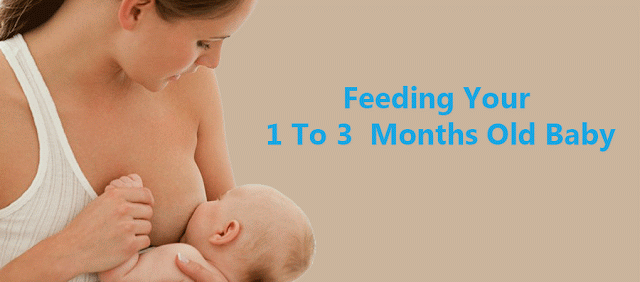As your baby develops,Feeding will change.Amid your infant’s initial 3 months, breast milk or formula feeding will give all the nutrition required. But when she or he grows they push toward consuming more milk during each feeding. Therefore baby will sleep longer at night,So you won’t need to feed her regularly.Within the first 3 months growth spurts will develop your baby’s appetite. Therefore continue to feed on demand and increase the number of feedings as needed.in addition to feeding, your infant will become more sensitive and alert as the weeks go by cooing and starting to develop a social smile.So you will be able to see more interactions between you and your baby during feedings.
General rules of feedings are as follows, But its important to understand your infant might be pretty much regularly than this. Therefore it’s always very important to focus on your infant’s signs of being hungry or full.An infant who is getting enough may back off, stop, or move in the opposite direction of the breast or bottle.
How Much and How Often I should breastfeed ?
Breastfed babies will start to feed less often and sleep more after the first few weeks following birth,In that case you will be able to confirm your baby is eating enough if he or she:
- seems alert, content, and active
- is steadily gaining weight, growing, and developing
- feeds six to eight times per day
- is wetting and soiling diapers on a regular basis
But if your baby is not eating enough or is he or she appear dissatisfied, even after feeding and cries constantly or is irritable , Then you should contact your baby’s doctor.
Signs you should notice
- If your baby is more than 1 months old and he or she tend to have fewer bowel movements than they did before.breastfed babies tend to have .If your baby is about 2 months old and your baby doesn’t have a bowel movement after each feeding, or even every day. If your infant still hasn’t had a bowel movement after 3 days, contact your doctor.
- Amid times of fast development of your baby, you may see that your little one needs to feed more frequently. This successive nursing prompts the mother’s body to build her milk supply, and in a several days, supply will adjust according to the demand.
- Its very important that breastfed babies should get vitamin D supplements within the first few days of life, but additional supplements such as water, juice, and solid foods aren’t usually necessary
Things you should know about Formula feeding?
As you already know babies do digest formula gradually, so in case you’re bottle-feeding, your infant may have less feedings than a breastfed infant.But when your baby develops, he or she will have the capacity to eat more and may go for longer extends between feedings. You’ll additionally see that your infant is beginning to sleep longer at night.
Amid the second month, newborn may take around 4 or 5 ounces at each feeding. Before 3 months’ over, your baby will most likely need an extra ounce at each feeding.
IMPORTANT
1) It’s easier to overfeed when formula feeding since it requires less push to drink from a feeding bottle than from a breast. So ensure that the hole on the bottle’s nipple is the correct size. The fluid should drip gradually from the hole and not spill out. and stop feeding when your baby shows those signs of being full.
2) Never prop a bottle prop. Propping a bottle may cause stifling and it expands the times of getting ear infections and tooth decay.
ALSO READ : HOW TO FEED YOUR 4 TO 7 MONTHS OLD BABY
REFERENCE
kidshealth.org. 2017. Feeding. [ONLINE] Available at: http://kidshealth.org/en/parents. [Accessed 17 August 2017].








